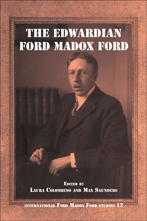
Laura Colombino et Max Saunders (dir.), The Edwardian Ford Madox Ford
Amsterdam/New York : Rodopi, coll. "International Ford Madox Ford Studies", 2013.
277 p.
EAN 9789042037021
€ 60 / US$ 81
Présentation de l'éditeur :
The controversial British writer Ford Madox Ford (1873-1939) is increasingly recognized as a major presence in early twentieth-century literature. This series of International Ford Madox Ford Studies was founded to reflect the recent resurgence of interest in him. Each volume is based upon a particular theme or issue; and relates aspects of Ford’s work, life, and contacts, to broader concerns of his time.
Ford is best-known for his fiction, especially The Good Soldier, long considered a modernist masterpiece; and Parade’s End, which Anthony Burgess described as ‘the finest novel about the First World War’, Samuel Hynes has called ‘the greatest war novel ever written by an Englishman’, and which has been adapted by Tom Stoppard for the acclaimed BBC/HBO television series.
This volume focuses on Ford’s work from the Edwardian decade and a half before the First World War. It contains Michael Schmidt’s Ford Madox Ford Lecture, and fourteen other essays by British, American, French and German experts, both leading authorities and younger scholars. Chapters on Ford’s fiction, poetry, criticism of literature and painting, writing about England, and dealings on the Edwardian literary scene as editor and with publishers, bring out his versatility and ingenuity throughout his first major creative phase.
Sommaire :
Max Saunders: General Editor’s Preface
Max Saunders: Introduction: Edwardian Ford?
Section 1: Ford on the Edwardian Literary Scene: Publishing and Criticism
Sara Haslam: Ford as Edwardian Author: Publishers, Trends, Markets
Michael Schmidt: Ford Madox Ford: The Good Collaborator
Dominique Lemarchal: Ford’s Henry James as a Double Impression
Joseph Wiesenfarth: Ford / Forster: Novel / Nuvvle
Section 2: Concern for the Country
Ashley Chantler: ‘In This Dead-Dawning Century’: Ford Madox Ford’s Edwardian Poetry
Donald Mackenzie: Edwardian Idyll, Edwardian Mapping: The Heart of the Country
Section 3: Edwardian Anxieties and Modern Fictions
Max Saunders: Empire of the Future: The Inheritors, Ford, Liberalism and Imperialism
Venetia Abdalla: ‘That Neurasthenia Joke’: Degeneration and Eugenics in the Work of Ford Madox Ford and Violet Hunt
Geraint Evans: Modernity and the Technology of Communication in Ford Madox Ford’s A Call and Henry James’s In the Cage
Leslie de Bont: From the Priest to the Therapist: Secrecy, Technique and Language in Ford Madox Ford’s A Call and May Sinclair’s Anne Severn and the Fieldings
Section 4: Fantasy, Vision and History
Laurence Davies: Ford’s Early Fiction and ‘Those Queer Effects of Real Life’
Jörg W. Rademacher: Ford Madox Ford on Hans Holbein, the Younger: Writing on Portraits and Portraits in Writing
Seamus O’Malley: The Fifth Queen, Revisionary History and the Staging of Nostalgia
Paul Skinner: ‘Pretty Big and Serious’: Ford Madox Ford and The Young Lovell